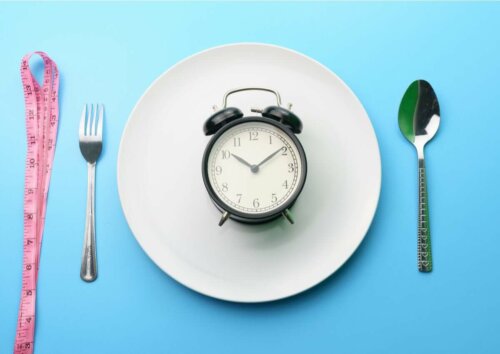3 Tips for Intermittent Fasting

Intermittent fasting has become fashionable for its efficiency and practicality. However, it’s important to fast properly to get the most out of it and form a habit. For that reason, in this article, we’ll offer three key tips for intermittent fasting so you can do it successfully.
Before we get started, it’s important you remember that fasting is a breakfast protocol, not a diet in itself. By this, we want to say that during the day, you can follow any dietary guidelines, regardless of whether you’ve planned an intermittent fast to promote weight loss or for other purposes.
Tips for intermittent fasting
With the following advice, you can start intermittent fasting gently without feeling hungry. Take notes!
Morning is better than evening
Despite the fact that you’ve got complete freedom to plan your fast for whenever suits you best, it’s clear that you’re more likely to follow it if the meal you eliminate from your diet is breakfast.
Beyond the metabolic benefits, you’re less likely to feel hungry throughout the morning. This is because, during this time, you go about your daily tasks, and are usually concentrated on your work. In addition, there are certain hormonal mechanisms that help you feel full even though you haven’t eaten anything.
Furthermore, when you do fast in the morning, you can complement this with moderate aerobic exercise. This causes your body to begin a metabolic synergy, increasing the oxidation of fats and mitochondrial reproduction.
It also stimulates autophagy, a mechanism that demonstrates several health benefits, as a study published in Clinics confirms.

Drink coffee when completing an intermittent fast
Caffeine doesn’t only increase fat oxidation and increase your reactions, it helps you feel full. For that reason, specialists define it as an anorectic substance.
Drinking coffee when fasting will help you to succeed, as you’re more likely to stick to it. This way, your appetite will significantly reduce, which will make it easier to complete a fast.
According to an investigation published in the European Journal of Clinical Nutrition, regularly consuming caffeine improves weight loss values and the possibility that you’ll maintain the changes to your body over time.
Plan your end-of-fast meal
Once you’ve finished your intermittent fast, it’s important to give your body a good hit of high-quality nutrients. Resorting to junk food is a terrible option; instead, you should always prioritize fresh foods.
The best option is to prepare a dish filled with proteins of a high biological value, products of animal origin are a good choice. This will help your body prepare tissues and avoid it breaking down lean mass.
Additionally, it’s vital you eat vegetables with a high level of antioxidants and unsaturated fats. These can help control inflammatory mechanisms.

Lastly, when it comes to carbohydrates, we recommend that you include the complex variety. The body digests these slower and they’re less likely to cause blood sugar level variations. For example, tubers are a great option.
An intermittent fast improves health
The positive effects of intermittent fasting on health are clear and few people question them. However, for some people, intermittent fasting is still difficult to follow. This may be due to poor planning or feeling hungry when trying it.
With these tips, we hope it’s a little easier to successfully fast. But, it’s important to remember that everyone is different. It’s clear that the more you practice intermittent fasting, the easier it is to control your weight and improve your metabolic health. We suggest you also try moderate aerobic exercise to increase the benefits.
Intermittent fasting has become fashionable for its efficiency and practicality. However, it’s important to fast properly to get the most out of it and form a habit. For that reason, in this article, we’ll offer three key tips for intermittent fasting so you can do it successfully.
Before we get started, it’s important you remember that fasting is a breakfast protocol, not a diet in itself. By this, we want to say that during the day, you can follow any dietary guidelines, regardless of whether you’ve planned an intermittent fast to promote weight loss or for other purposes.
Tips for intermittent fasting
With the following advice, you can start intermittent fasting gently without feeling hungry. Take notes!
Morning is better than evening
Despite the fact that you’ve got complete freedom to plan your fast for whenever suits you best, it’s clear that you’re more likely to follow it if the meal you eliminate from your diet is breakfast.
Beyond the metabolic benefits, you’re less likely to feel hungry throughout the morning. This is because, during this time, you go about your daily tasks, and are usually concentrated on your work. In addition, there are certain hormonal mechanisms that help you feel full even though you haven’t eaten anything.
Furthermore, when you do fast in the morning, you can complement this with moderate aerobic exercise. This causes your body to begin a metabolic synergy, increasing the oxidation of fats and mitochondrial reproduction.
It also stimulates autophagy, a mechanism that demonstrates several health benefits, as a study published in Clinics confirms.

Drink coffee when completing an intermittent fast
Caffeine doesn’t only increase fat oxidation and increase your reactions, it helps you feel full. For that reason, specialists define it as an anorectic substance.
Drinking coffee when fasting will help you to succeed, as you’re more likely to stick to it. This way, your appetite will significantly reduce, which will make it easier to complete a fast.
According to an investigation published in the European Journal of Clinical Nutrition, regularly consuming caffeine improves weight loss values and the possibility that you’ll maintain the changes to your body over time.
Plan your end-of-fast meal
Once you’ve finished your intermittent fast, it’s important to give your body a good hit of high-quality nutrients. Resorting to junk food is a terrible option; instead, you should always prioritize fresh foods.
The best option is to prepare a dish filled with proteins of a high biological value, products of animal origin are a good choice. This will help your body prepare tissues and avoid it breaking down lean mass.
Additionally, it’s vital you eat vegetables with a high level of antioxidants and unsaturated fats. These can help control inflammatory mechanisms.

Lastly, when it comes to carbohydrates, we recommend that you include the complex variety. The body digests these slower and they’re less likely to cause blood sugar level variations. For example, tubers are a great option.
An intermittent fast improves health
The positive effects of intermittent fasting on health are clear and few people question them. However, for some people, intermittent fasting is still difficult to follow. This may be due to poor planning or feeling hungry when trying it.
With these tips, we hope it’s a little easier to successfully fast. But, it’s important to remember that everyone is different. It’s clear that the more you practice intermittent fasting, the easier it is to control your weight and improve your metabolic health. We suggest you also try moderate aerobic exercise to increase the benefits.
All cited sources were thoroughly reviewed by our team to ensure their quality, reliability, currency, and validity. The bibliography of this article was considered reliable and of academic or scientific accuracy.
- Antunes, F., Erustes, A. G., Costa, A. J., Nascimento, A. C., Bincoletto, C., Ureshino, R. P., Pereira, G., & Smaili, S. S. (2018). Autophagy and intermittent fasting: the connection for cancer therapy?. Clinics (Sao Paulo, Brazil), 73(suppl 1), e814s. https://doi.org/10.6061/clinics/2018/e814s
- Icken, D., Feller, S., Engeli, S., Mayr, A., Müller, A., Hilbert, A., & de Zwaan, M. (2016). Caffeine intake is related to successful weight loss maintenance. European journal of clinical nutrition, 70(4), 532–534. https://doi.org/10.1038/ejcn.2015.183
This text is provided for informational purposes only and does not replace consultation with a professional. If in doubt, consult your specialist.








